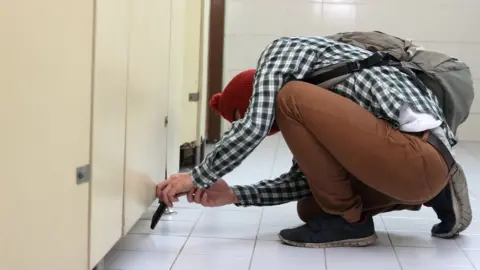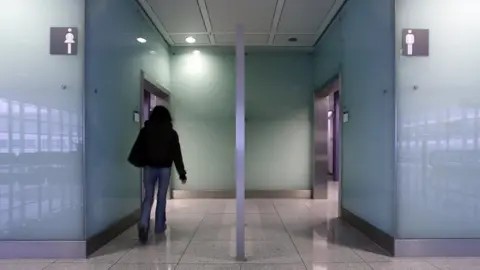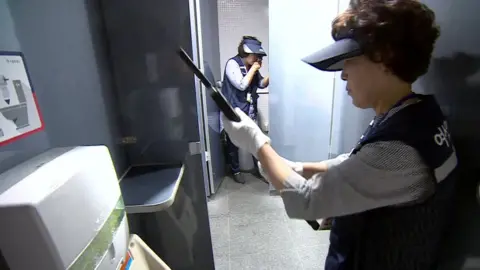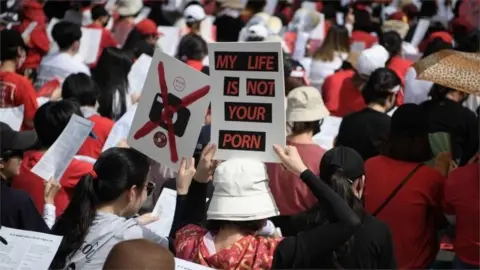South Korea's spy cam porn epidemic
 Getty Images
Getty ImagesI can remember the first time I heard about South Korea's spy cameras.
Just after arriving in Seoul, I was running to the public loo along the river Han while on a bike ride with a friend.
"Check it doesn't have a camera in it," she shouted. I turned around and laughed. But she wasn't kidding.
Many women have told me that the first thing they do when they go to a public toilet in South Korea is check for any peepholes or cameras. Just in case.
Because the country is in the grip of what's been described as a spy camera epidemic.
 Getty Images
Getty ImagesHidden cameras capture women - and sometimes men - undressing, going to the toilet, or even in changing rooms in clothing stores, gyms and swimming pools. The videos are posted online on pop-up pornography sites.
Activists in Seoul now warn that unless more is done to prevent it, this type of crime is likely to spread to other countries and will prove difficult to stop.
More than 6,000 cases of so-called spy cam porn are reported to the police each year, and 80% of the victims are women.
It's feared that hundreds more don't come forward to tell their stories. Some are filmed by men they thought were their friends.
The BBC spoke to one woman we've called Kim. She was filmed under the table at a restaurant. He put a small camera up her skirt. She spotted him and grabbed his phone - only to find other footage of her on there, and being discussed by other men.
"When I first saw the chat room, I was so shocked, my mind went blank and I started crying," Kim said. She went to the police but reporting the incident made her feel even more vulnerable.

"I kept thinking, what would other people think? Will the police officer think that my clothes were too revealing? That I look cheap?
"In the police station, I felt lonely. I felt all the men were looking at me as if I was a piece of meat or a sexual object. I felt frightened.
"I didn't tell anyone. I was afraid of being blamed. I was afraid my family, friends and people around me would look at me as these men looked at me."
The man was never punished.
Not just a Korean problem
South Korea is among the most technologically advanced and digitally connected countries in the world. It leads the world in smart phone ownership - nearly 90% of adults have one and 93% have access to the internet.
But it is these very advances that makes this crime so difficult to detect and the criminals so difficult to catch.
Park Soo-yeon founded the group Digital Sex Crime Out under the name Ha Yena in 2015 as part of a campaign to bring down one of the most notorious websites, called Soranet.
It had more than a million users and hosted thousands of videos taken and shared without the knowledge or consent of the women featured. Many of the website's spy cam videos were taken secretly in toilets and store changing rooms, or posted by ex-partners out for revenge.
Some of the women who appeared in the videos took their own lives.
 Getty Images
Getty Images"It is possible to bring down these videos but it is a real problem because it emerges again and again," says Ms Park.
"Distribution is a big challenge. The host sites put forward a defence saying they did not know these videos were filmed illegally. Really? How can they not know?"
She wants to target the distributors and believes that it needs to be an international effort.
"Digital sex crimes are not just a problem in Korea. There have been cases in Sweden and in the United States. But South Korea is so advanced technologically, with the fastest and most accessible internet in the world.
"That means these online crimes against women have become a big issue here first. It will not be long before this becomes a big problem in other countries. So we need to work together to solve the issue internationally."

You may also be interested in:

The South Korean police have two fundamental problems: catching the criminals, and prosecuting them.
Special teams have been inspecting public spaces across Seoul for hidden cameras. But they've never found any.

Inspector Park Gwang-Mi has spent two years searching more than 1,500 toilets in the Yongsan area of the city.
The BBC joined her on one sweep. She told us she was looking for any holes in the wall where cameras might have been placed.
"I'm learning how difficult it is to catch these criminals. The men install the camera and take it down within 15 minutes."
Arrests are made - of the 6,465 cases reported last year, 5,437 people were taken into custody.
But only 119 of those went to prison. That's just 2% of those caught.
'Their methods are developing'
Many South Korean women feel justice is not being done. There have been huge protests in the centre of Seoul, and there will be another demonstration this weekend.
Park Mi-hye is chief of a special sex crime investigation team for Seoul police. She told the BBC it's difficult to track down those using foreign servers.
"The distribution of this type of pornography is often not punished overseas. So even if it's illegal in Korea, it can't be investigated if it is legal in foreign countries or circulated on foreign sites.
"Even when we close down the webpage, they can tweak the web address a little and open the site again. We keep track of each change of address, but their methods continue to develop.
 AFP/Getty
AFP/Getty"The punishment for these crimes is also not severe. Right now the penalty is one year in prison or a fine of 10 million won ($8,900; £6,900) for distributing illegal footage. I think it would be helpful to raise the level of punishment.
"Most importantly, there must be a change in people's perceptions. In order to eradicate this kind of illegal crime, people have to be made aware of the impact on the victim."
You could argue the awareness is now there. Thousands of women are once again ready to take to the streets to cry "my life is not your porn" this weekend in the fourth such protest this year.
They believe it will take harsher punishments, higher prosecution rates and better methods of detecting this crime to tackle this rising problem.
Until then, we will all be checking our changing rooms in case we are being watched.
